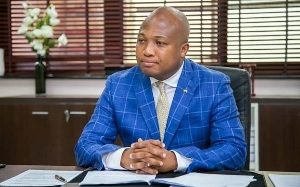When the very people entrusted with power, authority and influence decide to machinate and engineer favours towards their families, relatives and friends to the detriment of the citizens of the country, this is nepotism and cronyism. This is the exact state of today’s Ghana under the Akufo-Addo-Bawumia government.
The practice has in the past seven years become so rampant and glaring to the extent that Ghanaians are beginning to accept nepotism as a norm. There is a popular saying that “If an abomination stays too long, it becomes a part of the people’s culture”. Nepotism has become part of the Ghanaians’ unwanted culture to the extent that it is displayed on a daily basis. The unfortunate truth is that, it is gradually becoming a normal spectacle in this country.
Corruption is a problem morally and religiously speaking. But let us look at it from the angle of economics and we will understand that it is not just the corruption itself but the type of corruption. Part of the problem we have is incompetence, and that is why Ghanaians cannot afford to look on while this dangerous form of corruption perpetuates, we must speak up and pay attention to merit.
“Nepotism can never bring you success, but talent can” (Ashok Saraf)
Sadly, in today’s Ghana, nepotism has been normalised and elevated to a near-state policy by this Akufo-Addo-Bawumia government; Ghanaians have criticized the government for the lopsided appointments that include brothers, cousins, children and friends, but the president and his vice are unperturbed in the face of all these genuine criticisms.
Without sounding personal, the appointment of Nana Yaw Osarfo Marfo’s children into public offices is appalling and reprehensible. As a country, we have never experienced this level of nepotism that pervades through almost every member of the government including the Vice President’s family and in-laws. These are facts devoid of any malicious intent. Facts are sacred and immutable. After all, we all remember the president’s sardonic infamous “I will not run family and friends government”.
In defence of this dangerous act, we have been told that those family and friends who have been appointed to these juicy positions are qualified and deserve to be there. The question is how come they were not there until their relatives were elected.
Nepotism affects economic development by hindering human capital development. Perhaps, the reason why nepotism is perpetrated more in the public sector than in the private sector is that private sector organisations have profitable goals that need effective employees who have the competence to achieve the final goal, which is maximising the shareholders’ wealth. But the reality is different in the public sector because often there are no measurable goals, especially in Ghana, where the citizens are compelled to accept public service outcomes regardless of quality.
Our elders say “One whose father is in heaven would not be destined for hell”. This is the government’s defence to the unfortunate act of nepotism and cronyism under this Akufo-Addo-Bawumia government. Heaven is applied to figuratively refer to a privileged position or juicy public office, while hell refers to destituteness, hopelessness, unemployment, suffering and lack of privileges which millions of Ghanaians deserve, in their thinking.
One about President Akufo-Addo is his loyalty and commitment. He is one of the most loyal and committed people I have ever seen. However, his loyalty and commitment are only directed towards his friends, family and close associates, rather than to the national development. This has informed his inability to reshuffle his appointees. His loyalty and commitment to his associates is the main reason he is always quick to clear his appointees, earning him the moniker of a “clearing agent”.
The root of corruption is when we begin to de-emphasise merit, competence and performance, and so long as we don’t bring the best in this country to do the job and hold them to account, Ghana will not see development. The fear is that, as a country our silence has over the years gradually led to the culture of acceptance of the worst form of corruption which is nepotism under this Akufo-Addo-Bawumia government. People are getting into positions by virtue of personal loyalty, friendship and who they know, rather than what they can actually deliver by virtue of their competence for that office.
Ghanaians cannot be completely absorbed of the blame. We are of the view that the occupant of such office is expected to appropriate the position of his office to dispense favour and patronage to his relations with a view to improving their material condition.
It is because of this belief that appointments into public offices are usually greeted with cheer and celebration by associates of the appointee. Such excitement does not stem from the fact that the appointee has been given an opportunity to serve the country, rather, the appointee is going to use the discretionary powers of his office to improve the standard of living of his associates.
Thus, the success of a public officer is measured, not in terms of fulfilling the core mandate, which their office requires, but on how they used the appurtenances of their positions to improve the living conditions of their relations and cronies. They are expected to do this to the total exclusion of other Ghanaians since by the position they occupy, it is the ‘turn’ of their people to benefit from the perks of public appointment. It is a fact that nepotism is a threat to national inclusion and consequently affects all aspects of our democratic institutions, human rights and fundamental freedoms of Ghanaians.
Nepotism encourages laziness in a society, because, if the youth develops a mindset that suggests that, whether they work hard or not, there is a job waiting for them somewhere by the virtue of their relatives occupying positions of power, influence and authority, their is the propensity of them convincing themselves that, what then is the need to work hard? But, for a young man who knows that he has no firm anchor or support from anybody or community; who knows that his destiny is in his own hands, who knows that, if he doesn’t deny himself some pleasure even when his peers are enjoying, his hope of a better tomorrow becomes a pipe dream if he doesn’t move from his comfort zone to shape his tomorrow.
But, the unfortunate thing is that when he works harder to get his due, nepotism will only deny him that except, he displays a stubborn resilience by going the extra mile to satisfy the law of extra miles before it sparks divine intervention in his favour.
The current normalisation of nepotism has some intriguing dimensional consequences post this regime. The question is, would Ghanaians suddenly regain their voices and speak up against nepotism post this regime, or we would accept it as a norm in the next administration? It is therefore essential to express our disgust and displeasure on the nepotistic tendencies we are witnessing, rather than remain silent because as a society seeking to develop, we cannot afford to be accustomed to nepotism and its consequences.
It is therefore not too late for all and sundry to, speak against this form of corruption and make it known that we find this act unacceptable and reprehensible, because turning a blind eye to this canker is dangerous and will inhibit and undermine economic development by deepening poverty in our societies.
Opinions of Sunday, 23 June 2024
Columnist: Awudu Razak Jehoney
Normalisation of nepotism and cronyism by the Akufo-Addo-Bawumia government
Entertainment


















